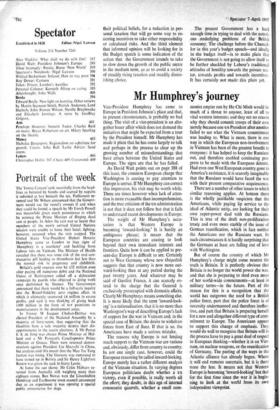Mr Humphrey's journey
Vice-President Humphrey has come to Europe in President Johnson's place and that, in present circumstances, is probably no bad thing. The visit of a vice-president is an alto- gether lesser affair which does not demand the initiatives that might be expected from a tour by the President himself. Mr Humphrey has made it plain that he has come largely to talk and perhaps in the process to clear up the growing number of misunderstandings • that have arisen between the United States and Europe. The signs are that he has failed.
As David Watt points out on page 388 of this issue, the common European charge that Washington is ceasing to pay attention to Europe is untrue. If Mr Humphrey can correct this impression, his visit may be worth while. There are times however when lack of atten- tion is more excusable than incomprehension, and the true criticism of the us administration is not that it does not follow but that it fails to understand recent developments in Europe.
The weight of Mr Humphrey's accu- sation is that Western Europe is becoming 'inward-looking.' It is hardly an ambiguous phrase; it means that the European countries are ceasing to look beyond their own immediate interests and frontiers. Quite how it can be applied to pre- sent-day Europe is difficult to see. Certainly not to West Germany whose new Ostpolitik suggests that that country is now more out- ward-looking than at any period during the past twenty years. And whatever may be said of Gaullist France, it can scarcely ex- tend to the charge that the General is exclusively preoccupied with domestic affairs. Clearly Mr Humphreys means something else. It is more likely that the term 'inward-look- ing' is a rationalisation, that it is no more than Washington's way of describing Europe's lack of support for the war in Vietnam and, in the special case of Britain, the desire to withdraw forces from East of Suez. If that is so, the Americans have made a serious mistake.
The reasons why Europe is not lending much support to the Vietnam war are various and, obviously, differ from country to country. In not one single case, however, could the European reasoning be called inward-looking. Europe merely has a rather different analysis of the Vietnam situation. In varying degrees European politicians doubt whether a us victory, even if possible, is really worth all the effort; they doubt, in this agi of internal communist quarrels, whether a small com- munist empire run by Ho Chi Minh would be much of a threat to anyone, least of all to vital western interests; and they see no reason why they should commit troops of their own merely because one us President after another failed to see what the Vietnam commitment was leading to. What is more, there is one way in which the European non-involvement in Vietnam has been of the greatest benefit to everyone: it has helped to keep the Russians out, and therefore enabled continuing pro- gress to be made with the European detente. Had even one West European country gone to America's assistance, it is scarcely imaginable that the Russians would have faced the war with their present comparative acquiescence.
There are a number of other issues to which similar reasoning applies. At bottom there is the wholly justifiable suspicion that the Americans, while paying lip service to the ideal of Atlantic unity, are looking for their own super-power deal with the Russians. This is true of the draft non-proliferation treaty and even more starkly of the issue of German reunification, which in fact neither the Americans nor the Russians want. In such circumstances it is hardly surprising that the Germans at least are falling out of love with Washington.
But of course the country of which Mr Humphrey's charge might come nearest the truth is Britain. It is perfectly obvious that Britain is no longer the world power she was, and that she is preparing to shed even more of her world-wide commitments—at least in military terms—in the future. Part of the reason for this is a recognition that the world has outgrown the need for a British police force, part that the police force is of necessity undermanned and therefore ineffec- tive, and part that Britain is preparing herself for a new and altogether different type of com- mitment to Europe. The Americans appear to support this change of emphasis. They would do well to recognise that Britain will in the process have to pay a great deal of respect to European thinking—whether it is on Viet- nam, on nuclear weapons, or the reunification of Germany. The parting of the ways in the Atlantic alliance has already begun. Where it will end remains uncertain, but it is there none the less. It means not that Western Europe is becoming 'inward-looking' but that for the first time since the war it is begin- ning to look at the world from its own independent viewpoint.






























 Previous page
Previous page